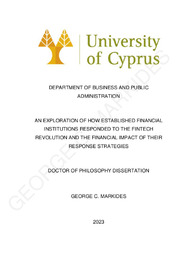| dc.contributor.advisor | Kassinis, George | en |
| dc.contributor.author | Markides, George | en |
| dc.coverage.spatial | Cyprus | en |
| dc.creator | Markides, George | en |
| dc.date.accessioned | 2024-01-25T08:13:29Z | |
| dc.date.available | 2024-01-25T08:13:29Z | |
| dc.date.issued | 2023-12-19 | |
| dc.identifier.uri | http://gnosis.library.ucy.ac.cy/handle/7/66083 | en |
| dc.description | Includes bibliographical references. | en |
| dc.description | Number of sources in the bibliography: 175 | en |
| dc.description | Thesis (Ph. D.) -- University of Cyprus, Faculty of Economics and Management, Department of Public and Business Administration, 2022. | en |
| dc.description | The University of Cyprus Library holds the printed form of the thesis. | en |
| dc.description.abstract | This work studies how established financial institutions responded to the emergence of FinTech start-up firms in the period 2007-2019. We first explore three of the most popular strategies established firms have used to respond to the FinTech disruption: acquiring the disruptor, forming strategic alliances with them, and purchasing an equity stake in them. We examine both the short-term and long-term valuation effects of these transactions and find that, in the short term, acquisitions create value, alliances destroy value, and equity participation investments have an insignificant valuation effect. By contrast, in the long run, all three strategies destroy shareholder value. Secondly, we differentiate between FinTech startups that can be disruptive to the established firms versus those that are not. We examine whether transactions with “disruptive” startups create more value for established firms than transactions with non-disruptive ones. We argue and show that the disruptive nature of the target or alliance partner plays an important role in the value created by these transactions. Specifically, acquisitions of disruptive targets, on average, create more value to the acquirers than acquisitions of non-disruptive targets. At the same time, alliances with disruptive partners are less value-destroying than alliances with disruptive targets. In addition, we find that investment banks exploit new disruptive technologies better than commercial banks. Thirdly, we examine how the value of the technology that each start-up firm possesses impacts value creation. We propose a new measure of the value of the technology acquired (“complexity of technology”) and show that the more complex a technology the more value it brings to its owner. In sum, we shed light on an interesting and materially important phenomenon for the financial services industry. Despite the existence of anecdotal evidence that shows that established firms have responded to the FinTech disruption, the literature has not systematically examined the financial performance impact of response strategies, nor has it explored the theoretical reasons why some response strategies create value while others do not. Our work addresses this important gap in the literature. | en |
| dc.language.iso | eng | en |
| dc.publisher | Πανεπιστήμιο Κύπρου, Σχολή Οικονομικών Επιστημών και Διοίκησης / University of Cyprus, Faculty of Economics and Management | |
| dc.rights | CC0 1.0 Universal | * |
| dc.rights | info:eu-repo/semantics/openAccess | en |
| dc.rights | Open Access | en |
| dc.rights.uri | http://creativecommons.org/publicdomain/zero/1.0/ | * |
| dc.title | An exploration of how established financial intitutions responded to the fintech revolution and the financial impact of their response strategies | en |
| dc.title.alternative | Εξερεύνηση των τρόπων που τα χρηματοοικονομικά ιδρύματα ανταποκρίθηκαν στην επανάσταση των Fintech και των οικονομικών επιπτώσεων των στρατηγικών απάντησής τους | el |
| dc.type | info:eu-repo/semantics/doctoralThesis | en |
| dc.contributor.committeemember | Soteriou, Andreas | en |
| dc.contributor.committeemember | Milidonis, Andreas | en |
| dc.contributor.committeemember | Nicolaides, Christos | en |
| dc.contributor.committeemember | Michaelides, Alexander | en |
| dc.contributor.department | Τμήμα Δημόσιας Διοίκησης και Διοίκησης Επιχειρήσεων / Department of Public and Business Administration | |
| dc.subject.uncontrolledterm | ΧΡΗΜΑΤΟΟΙΚΟΝΟΜΙΚΕΣ ΤΕΧΝΟΛΟΓΙΕΣ | el |
| dc.subject.uncontrolledterm | ΕΞΑΓΟΡΕΣ | el |
| dc.subject.uncontrolledterm | ΣΤΡΑΤΗΓΙΚΕΣ ΣΥΜΜΑΧΙΕΣ | el |
| dc.subject.uncontrolledterm | ΣΥΜΜΕΤΟΧΗ ΚΕΦΑΛΑΙΩΝ | el |
| dc.subject.uncontrolledterm | FIN TECH | en |
| dc.subject.uncontrolledterm | M&AS | en |
| dc.subject.uncontrolledterm | STRATEGIC ALLIANCES | en |
| dc.subject.uncontrolledterm | EQUITY PARTICIPATION | en |
| dc.author.faculty | Σχολή Οικονομικών Επιστημών και Διοίκησης / Faculty of Economics and Management | |
| dc.author.department | Τμήμα Δημόσιας Διοίκησης και Διοίκησης Επιχειρήσεων / Department of Public and Business Administration | |
| dc.type.uhtype | Doctoral Thesis | en |
| dc.contributor.orcid | Kassinis, George [0000-0003-0743-2837] | |
| dc.contributor.orcid | Soteriou, Andreas [0000-0001-8527-3742] | |
| dc.contributor.orcid | Milidonis, Andreas [0000-0001-9131-1098] | |
| dc.contributor.orcid | Nicolaides, Christos [0000-0002-1485-2736] | |
| dc.contributor.orcid | Michaelides, Alexander [0000-0002-0343-3958] | |
| dc.contributor.orcid | Markides, George [0009-0000-9497-4022] | |
| dc.gnosis.orcid | 0000-0003-0743-2837 | |
| dc.gnosis.orcid | 0000-0001-8527-3742 | |
| dc.gnosis.orcid | 0000-0001-9131-1098 | |
| dc.gnosis.orcid | 0000-0002-1485-2736 | |
| dc.gnosis.orcid | 0000-0002-0343-3958 | |
| dc.gnosis.orcid | 0009-0000-9497-4022 | |


